Retreading’s Stubborn Struggle
- By Gaurav Nandi
- August 29, 2025
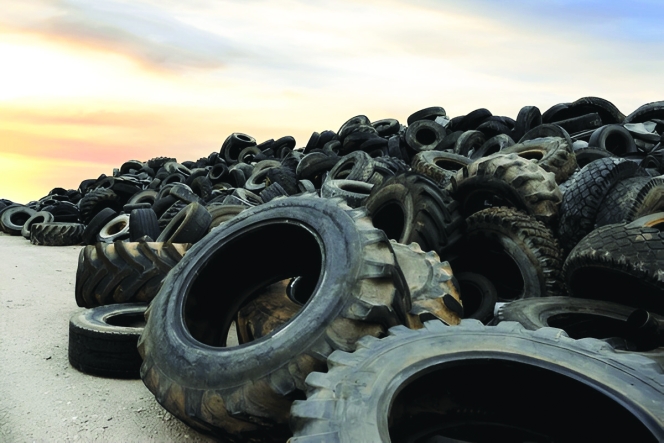
Despite decades of presence and proven sustainability benefits, the global truck tyre retreading industry remains mired in perception problems and systemic inertia. As raw material costs rise and environmental pressures mount, retreading should be a no-brainer. Yet, it continues to be sidelined by outdated mindsets, customer ignorance and a lack of cohesive industry messaging. Tirecore CEO Garry Drisdelle, in a candid interview with Tyre Trends, paints a picture of a sector at risk – not because it lacks value, but because it has failed to communicate it. The stakes, he warns, are too high for complacency.
Despite decades of existence, the retreading industry still wrestles with fundamental challenges across the world – not least the stubborn perception among customers and stakeholders about the true value of retreaded truck tyres. Tirecore Chief Executive Officer Garry Drisdelle pulls no punches in diagnosing the sector’s issues and outlining the uphill battle ahead.
Speaking to Tyre Trends, he said, “Tirecore is primarily a supplier of quality truck tyre casings to the retread industry. But while retreading should logically form the cornerstone of sustainable tyre use, the industry remains far from mainstream acceptance.”
“Educating the customers really as to how much upcycling, how much can we save – it’s beyond the pennies or pounds you save on the initial purchase,” Drisdelle said. Yet, frustratingly, many customers remain fixated on upfront costs instead of the total lifecycle value of a tyre.
This fixation, he implies, represents a systemic failure within the industry. “The industry has to do a better job towards educating the consumers, which primarily are fleet owners, beyond the initial purchase,” said Drisdelle. The inability to shift consumer mindset threatens to leave retreading as a niche rather than a necessity.
Tirecore positions itself primarily as a global supplier of high-quality truck tyre casings to the retread industry, operating across markets that include the United States, Canada and India. Rather than manufacturing or retreading tyres directly, the company serves as a critical node in the circular economy of commercial tyres, ensuring that valuable casings find extended life through retreading.
“We are in the business of preserving 85 percent of the tyre components existing material’s value saving valuable resources,” said Drisdelle.
The company’s operational model is rooted in the principle of upcycling over replacement, focusing on longevity and material reuse rather than disposability. While Tirecore’s precise logistical affiliations remain unspecified, its strategic direction is clearly aimed at aligning with sustainability mandates and evolving global market demands.
DISPOSABLE TREATMENT
Drisdelle highlights a critical contradiction. Tyres are one of the most safety-critical components on the road, yet they are taken for granted at a staggering scale. “Picture a truck is rolling down the highway at 100km/h pulling 20,000 kilogrammes of freight, riding on just 6-8-10 rolling rubber contact points. Tyres are one of the most critical transportation components, yet we treat them like disposable goods. How taken for granted is that product?”
Even as raw material prices surge and truck tyre costs climb, the entrenched perception treats tyres as disposable consumables. “We need to reframe the conversation – a tyre should be seen as an asset and not a consumable,” Drisdelle emphasises.
This disconnect reveals deeper issues prevalent within the industry. Retreading has not been effectively communicated as a financial and environmental beneficial in the long tome. Moreover, legislative inconsistency and lack of incentives for the industry as a whole is a deterrent that needs to be addressed immediately.
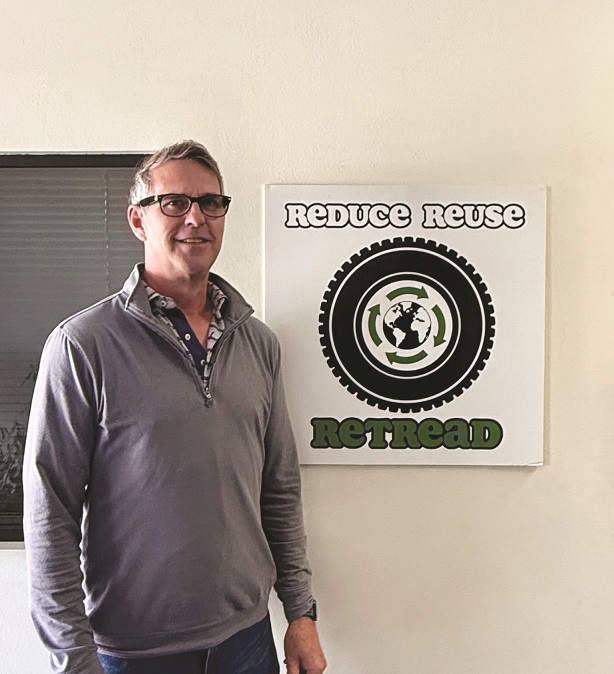 Drisdelle insists that retreading should be the environmental rallying point for the sector. “We have 85 percent of the material in the original product that is quite capable of being reprocessed and upcycled many times,” he said.
Drisdelle insists that retreading should be the environmental rallying point for the sector. “We have 85 percent of the material in the original product that is quite capable of being reprocessed and upcycled many times,” he said.
He contrasts upcycling favourably with recycling, which he argues requires more energy and effort than the original production process, especially in plastics and other materials: “By the time you just recycle something, the energy to recycle it is more than the process.”
Yet these arguments come with an implicit critique that the industry has failed to effectively translate this environmental rationale into a compelling value proposition for customers and regulators alike.
LEGISLATIVE MOMENTUM
Drisdelle points to potential legislation requiring truck tyres to be recyclable or retreadable as a possible catalyst for change. “Picture if legislation comes out that you’re not allowed to sell truck tyres unless they’re recyclable from their ingredients unless they’re retreadable,” he noted.
However, he quickly tempers this with realism stating, “We can never get to zero. That’s a cool little marketing thing but it’s an impossibility in the world of physics and science.”
This admission highlights the gap between aspirational sustainability goals and practical realities, a gap that leaves retreading vulnerable to accusations of greenwashing or insufficient progress.
ADAPT OR STAGNATE
Looking to the future, Drisdelle’s plan is pragmatic but cautious. “Our future plans are to keep up with the market demand, to evolve as the market evolves. Pivot and prosper,” he said.
Such a measured approach reflects the uncertainty and fragmentation within the industry. The promise of retreading remains strong, but without decisive action on education, regulation and innovation, the sector risks losing ground to cheaper, new tyres or alternative technologies.
The recurring theme throughout Drisdelle’s commentary is education, or rather, the lack of it. “The education of the fleet owners is primary to everything. The education of the industry to build a better tyre is somewhat secondary,” he stated.
This stark admission speaks volumes. Despite retreading’s environmental and economic advantages, a fundamental communication failure continues to hobble the industry.
Drisdelle points out the irony stating, “Without a widespread cultural shift in perception, retreading will struggle to move beyond a cost-saving niche for price-sensitive fleets to a mainstream standard.”
Drisdelle’s blunt assessment of the retread industry reveals a sector caught between its potential and its persistent shortcomings. Tirecore’s role as a global supplier to retreaders is clear but the wider challenge remains.
Without significant progress on education and regulatory backing, the retread industry risks remaining on the margins, overshadowed by the convenience of new tyres and the pressures of market inertia.
Retreading’s promise is substantial. But, as Drisdelle’s comments underscore, fulfilling that promise demands a candid reckoning with the industry’s educational failures and a relentless push for change or face stagnation in a rapidly evolving tyre market. n
Zeon And Visolis Sign Binding Term Sheet To Advance Bio-Isoprene And SAF Commercialisation
- By TT News
- February 16, 2026
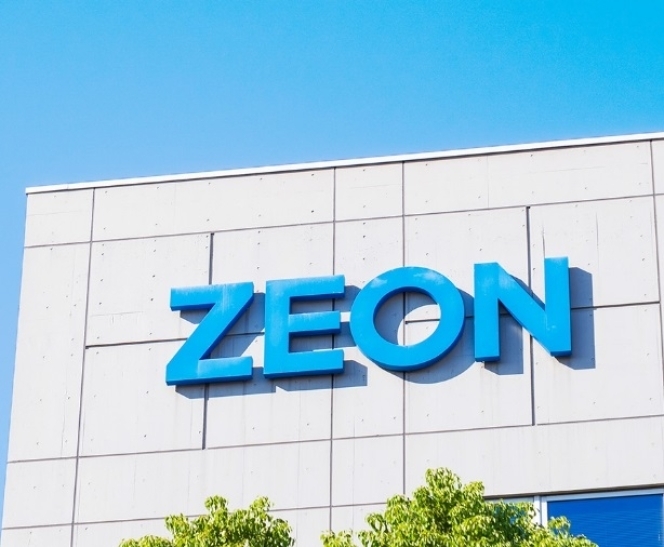
Zeon Corporation and Visolis Inc. have formalised their partnership by signing a binding term sheet, marking a pivotal advancement in the commercialisation of bio-based isoprene monomer and sustainable aviation fuel (SAF).
This collaboration, which now moves from technology verification towards project implementation, is built upon the progress made since their initial memorandum of understanding in March 2024 and the subsequent joint feasibility study announced in April 2025. Bio-based isoprene monomer serves as an essential component in the production of synthetic rubbers and various other materials, while SAF is increasingly recognised as a critical next-generation fuel for reducing carbon emissions within the aviation industry.
The newly established term sheet outlines a foundational agreement on the key elements required for a final investment decision. These include defining the business structure and the respective roles of each company, establishing technology and development strategies and advancing detailed engineering for the proposed production facility. Furthermore, the agreement covers the evaluation of potential sites, the process for engaging with suppliers, securing necessary regulatory approvals and planning the financing pathway.
The envisioned facility is set to commence commercial-scale output after successfully demonstrating mass production capabilities for biomass-based isoprene and SAF, utilising Visolis’ proprietary technology. Both companies are now committed to expediting the path to full-scale production and ensuring a steady supply of these sustainable products to the global market.
Zeon Backs Chemify To Accelerate Digital Chemistry Innovation
- By TT News
- February 12, 2026
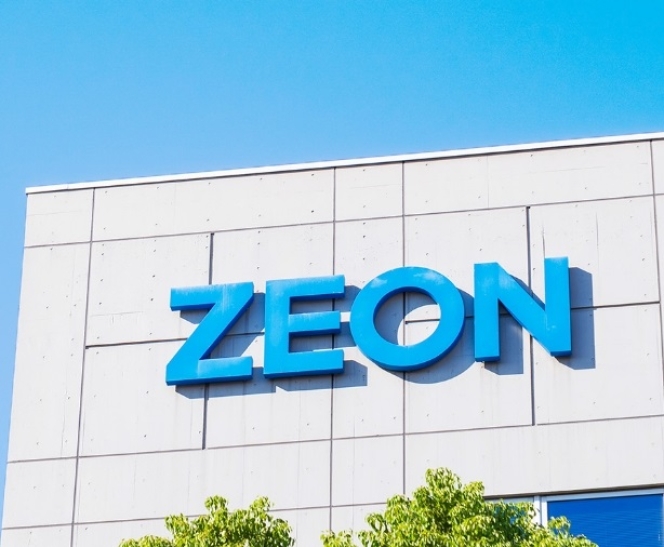
Zeon Corporation has deepened its commitment to digital chemistry through a strategic investment and partnership with Chemify Limited, secured via its corporate venture arm Zeon Ventures Inc. Chemify, a growth-stage UK enterprise, is reshaping molecular research by integrating digital tools with automated laboratory systems. Its proprietary Chemputation technology translates molecular targets into executable chemical code, which operates directly on robotic platforms to complete integrated Design–Make–Test–Analyze cycles without manual intervention. This closed-loop automation allows Chemify to explore previously inaccessible areas of chemical space while reducing the timeline from concept to synthesized compound by up to tenfold.
A cornerstone of Chemify’s capability is its recently inaugurated Chemifarm in Glasgow – one of the most sophisticated automated facilities in the world for molecular design and construction. The facility enables accelerated iteration and autonomous synthesis of novel small molecules, converting chemical code into tangible compounds with unprecedented efficiency. These advances are critical for developing functional, synthesisable molecules that can contribute solutions to urgent global issues spanning public health, energy efficiency and environmental protection.
Zeon has been at the forefront of adopting digital methodologies in chemical R&D, recognising their transformative potential from an early stage. This investment is positioned to strengthen Zeon’s internal digital chemistry efforts and catalyse the invention of novel materials capable of addressing complex societal needs. The move aligns with Zeon’s STAGE30 corporate strategy, which targets a rise in revenue contribution from four key growth sectors – Mobility, Healthcare and Life Sciences, Telecommunications and Green Transformation – to 48 percent by fiscal 2028. By backing pioneering enterprises and cultivating advanced materials, Zeon continues to advance its dual vision of a sustainable planet and a secure, progressive society.
- Rubber Board Of India
- Rubber Producers’ Societies
- Sulphur Dusting
- Powdery Mildew
- Rubber Plantations
- Rubber Board Subsidy
Rubber Board Announces Sulphur Dusting Subsidy For Rubber Producers
- By TT News
- February 09, 2026

The Rubber Board of India has announced the opening of an application window for financial aid for sulphur dusting to combat powdery mildew disease in rubber plantations for the year 2026. The scheme is open to all Rubber Producers’ Societies (RPS) operating in both traditional and non-traditional growing regions.
From 10 to 20 February 2026, eligible societies must submit their applications online through the 'ServicePlus' portal on the official Rubber Board website. Societies requiring help with the submission process are advised to contact their nearest Rubber Board regional office or field station, or to consult the board's website for further guidance.
French Recognition Of TPO Bolsters Pyrum's Circular Economy Model
- By TT News
- February 09, 2026
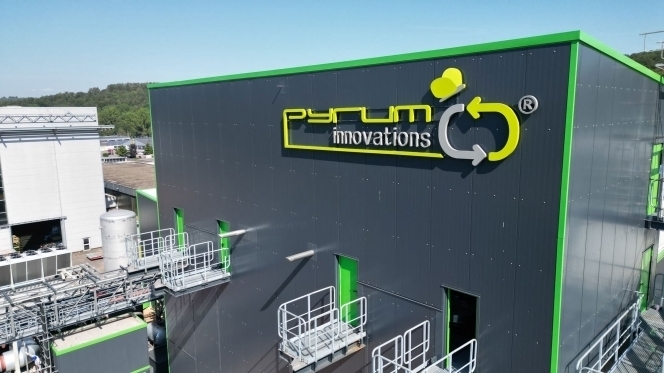
Pyrum Innovations AG has welcomed the official recognition by French authorities on 17 January 2026, which classifies tyre pyrolysis oil (TPO) as a legitimate raw material for the chemical sector. This pivotal regulatory milestone for pyrolysis oil derived from end-of-life tyres substantially enhances the product’s integration into established chemical value chains. It also provides greater predictability for future purchase and partnership frameworks, thereby accelerating the development of industrial material cycles.
For Pyrum, which processes scrap tyres through pyrolysis to recover pyrolysis oil, industrial carbon black and steel, this decision underscores the critical need for standardised and reliable regulatory conditions. Such clarity is fundamental for scaling investments, production volumes and supply chains, particularly as the chemical industry and circular economy converge. The establishment of clear product categories is essential to ramp up the market for high-quality recycled raw materials.
The company remains committed to tracking further developments in France and the wider European dialogue regarding the classification and application of recycled feedstocks. Pyrum’s overarching objective is to expand industrial-scale recycling solutions for scrap tyres. This regulatory progress directly supports the company’s mission to secure long-term, quality-assured supply agreements with partners across the chemical industry, thereby advancing a more sustainable and circular economic model.
Pascal Klein, CEO, Pyrum Innovations AG, said, “The decision in France is an important step for the industrial use of pyrolysis oil from waste tyres. It supports a trend that we are seeing in many markets, where the chemical industry is seeking reliable, technologically robust and clearly classified alternative raw materials.”







Comments (0)
ADD COMMENT